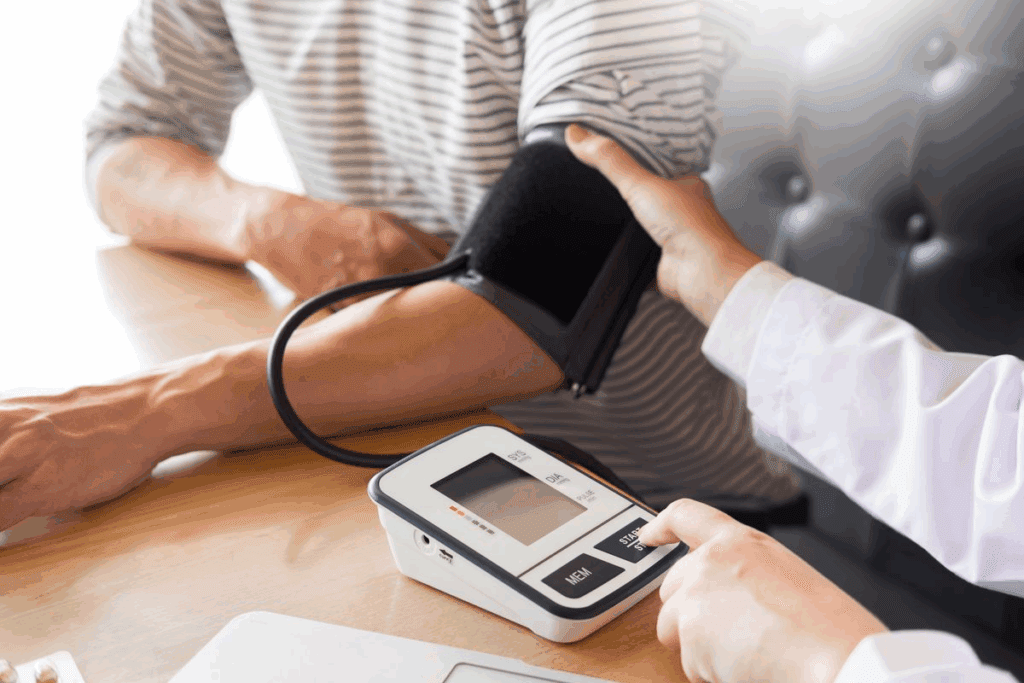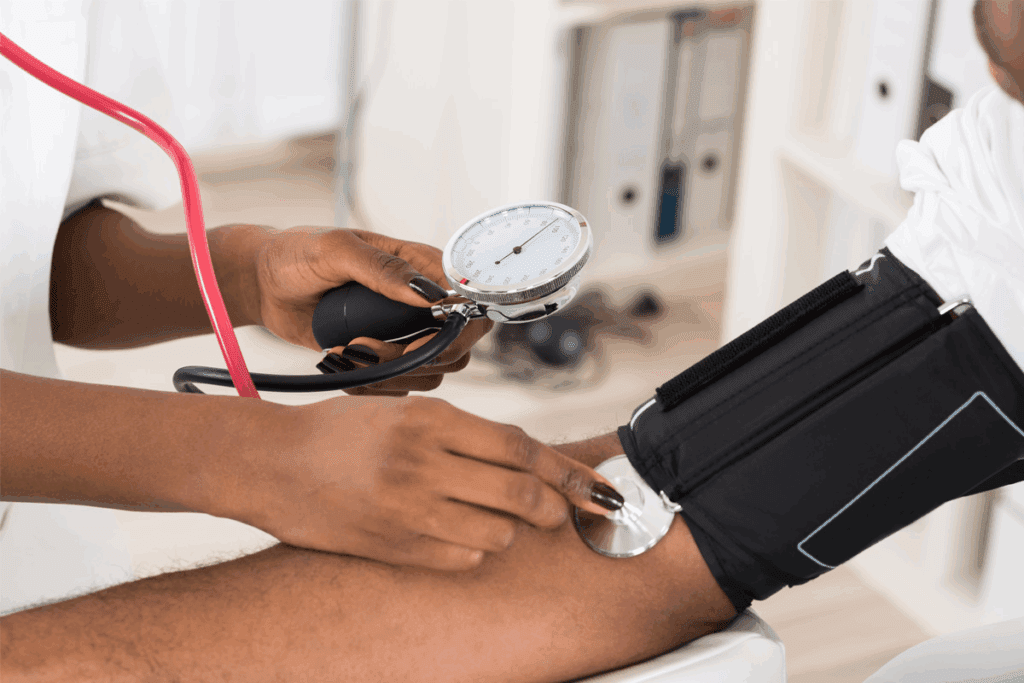
Hypertension is no longer just a concern for older adults. Recent statistics show a sharp rise in high blood pressure among young adults. This is due to various modifiable risk factors.
Find out what causes hypertension in young adults and how to reduce the risk.
We are seeing a big increase in young age hypertension. This is because of obesity, high salt intake, not enough physical activity, and bad dietary habits. The WHO says about 1.4 billion adults aged 30–79 worldwide had hypertension in 2024. This is 33% of the population in this age range.
It’s important to act early and make lifestyle changes to prevent problems. At Liv Hospital, we are dedicated to top-notch healthcare. We offer full support for international patients.

Hypertension among young adults is a growing concern. Nearly half of U.S. adults have high blood pressure, with many being young. This is not just a number; it’s a serious health issue.
About 1 in 5 deaths from COVID-19 were linked to high blood pressure. This shows how risky it is for those with hypertension. The CDC says 48.1% of U.S. adults, or 119.9 million people, have high blood pressure.
This is a big problem. Hypertension is no longer just for older people. Young adults are getting it too, which can cause heart disease, stroke, and kidney damage if not treated.
Hypertension in young adults is a big deal because it can harm their health for a long time. Early onset hypertension can lead to heart disease early, cutting down on life quality and life span. It also means big changes in lifestyle, which can be hard for young people.
The main reasons for high blood pressure in young adults include obesity, high salt intake, not being active, smoking, drinking too much, and stress. Changing these habits is key to preventing and managing high blood pressure in young adults.

Hypertension is more than just blood pressure numbers. It affects your health in many ways. We’ll explore what high blood pressure means for young people and why catching it early is key.
High blood pressure is when your systolic reading is ≥140 mmHg or your diastolic is ≥90 mmHg. This is according to the World Health Organization (WHO). Knowing this helps spot people with hypertension.
Having a family history of high blood pressure increases your risk. It’s important for young adults, mainly those with a family history of hypertension.
| Blood Pressure Category | Systolic Blood Pressure (mmHg) | Diastolic Blood Pressure (mmHg) |
| Normal | <120 | <80 |
| Elevated | 120-129 | <80 |
| Hypertension Stage 1 | 130-139 | 80-89 |
| Hypertension Stage 2 | ≥140 | ≥90 |
Hypertension is often called a “silent killer” because it doesn’t show symptoms until it’s severe. Catching it early is key to avoiding heart damage.
Why is early detection important? Finding hypertension early means you can act fast. This can greatly lower your risk of heart disease and stroke.
Regular blood pressure checks are vital. They help find those at risk and ensure they get the right care.
Understanding hypertension and its risks helps young adults protect their heart health. They can make lifestyle changes and seek medical help if needed.
Hypertension in young adults is a growing concern. Obesity is a main cause of this condition. It’s important to tackle this issue to prevent heart problems later on.
Being overweight or obese affects blood pressure in many ways. Insulin resistance and vascular dysfunction play big roles. When young adults are overweight, their bodies often resist insulin, causing blood sugar levels to rise.
This can harm blood vessels, making them stiff and narrow. This narrowing raises blood pressure. Excess weight also causes chronic inflammation, which damages blood vessels and raises blood pressure even more.
| Physiological Change | Impact on Blood Pressure |
| Insulin Resistance | Increased blood sugar levels damage blood vessels |
| Vascular Dysfunction | Reduced flexibility and increased narrowing of blood vessels |
| Chronic Inflammation | Damage to vascular health, contributing to higher blood pressure |
To break the obesity-hypertension cycle, we need to make lifestyle changes. Losing weight is key to lowering blood pressure and reducing heart disease risk. The World Health Organization (WHO) says losing weight can greatly improve blood pressure control.
Good strategies include eating a healthy diet full of fruits, veggies, and whole grains. Also, regular physical activity is important. These changes help manage weight and lower blood pressure.
By understanding the obesity-hypertension link and making these changes, young adults can lower their risk of high blood pressure and heart problems.
Diet plays a big role in blood pressure. High salt intake and eating too much processed food are key factors. Our modern diet is often loaded with sodium, thanks to processed and packaged foods.
Many don’t realize how much salt they eat every day. Processed foods are packed with sodium, adding up to a lot of salt in our diets. Foods that don’t taste salty can actually have a lot of sodium.
Let’s explore some common sources of sodium:
| Food Item | Sodium Content (mg) |
| 1 slice of white bread | 200-300 |
| 1 cup of canned soup | 900-1000 |
| 1 serving of processed snack | 150-250 |
High salt intake isn’t the only issue. Other diet choices can also raise blood pressure. A diet lacking fruits, vegetables, and whole grains but full of processed meats and sugary drinks is bad for blood pressure.
To keep blood pressure in check, we need a balanced diet. Here are some tips:
Making smart food choices can lower the risk of high blood pressure. It’s all about finding a balance and being careful about what we eat.
Physical inactivity is a big problem for young adults, leading to more cases of high blood pressure. Our sedentary lifestyles increase the risk of high blood pressure. It’s important to stay active to keep our hearts healthy.
Not moving enough can cause obesity, insulin resistance, and heart disease. These are serious health issues.
Today, we spend more time sitting at desks and staring at screens. This has made us less active. The rise of sedentary lifestyles is a big reason for high blood pressure in young people.
Research shows that sitting too much can raise blood pressure, even for those who seem healthy.
Exercise is a strong way to fight and control high blood pressure. It makes our hearts work better, lowers blood pressure, and helps blood vessels relax. We suggest doing at least 150 minutes of moderate exercise or 75 minutes of intense exercise each week.
Or, a mix of both is best to manage blood pressure.
Tobacco and alcohol are big risks for high blood pressure in young people. The World Health Organization (WHO) says they are major causes of heart disease. We’ll look at how these substances affect blood pressure and heart health in young adults.
Smoking can raise blood pressure right away. The chemicals in tobacco make blood vessels narrow, increasing blood pressure. This effect is short-lived but can lead to long-term high blood pressure.
Long-term smoking damages blood vessel linings, making them more likely to block. Smoking greatly increases the risk of heart disease, making quitting essential to lower hypertension risk.
Secondhand smoke also raises blood pressure risks. We must think about the health effects of smoking on those around smokers.
Drinking too much alcohol is another big risk for high blood pressure. While some people might not see a big change in blood pressure from moderate drinking, too much can raise it. The link between alcohol and high blood pressure is complex, with how much you drink, how often, and your body’s sensitivity all important.
Drinking a lot can cause blood pressure to stay high, raising heart disease risk. Cutting down on alcohol is often advised to manage and prevent high blood pressure. Knowing safe drinking limits and the benefits of drinking less can help manage blood pressure.
Many young adults today face chronic stress, which can lead to high blood pressure. Stress hormones like cortisol and adrenaline play a big role in this. The CDC notes this effect.
“Chronic stress is a big problem in today’s world, hitting young adults hard,” a study found. It affects blood pressure in many ways, from immediate reactions to long-term heart changes.
Stress hormones make blood vessels narrow, raising blood pressure. Cortisol, known as the ‘stress hormone,’ is key in this process. High cortisol levels from chronic stress can cause lasting high blood pressure.
Stress hormones do more than just narrow blood vessels. They can also cause inflammation and damage to the blood vessel lining. This makes hypertension worse.
Young adults today deal with unique digital age stressors. The constant need to stay connected and the flood of information can be stressful. Social media, in particular, can be a big stressor with cyberbullying, comparisons, and the need to look perfect online.
Managing digital age stressors is possible. Digital detox, mindfulness, and setting limits on social media use can help. By tackling these stressors, young adults can lower their blood pressure.
Understanding chronic stress’s role in high blood pressure is key. By knowing how stress affects blood pressure and tackling digital age stressors, we can help young adults avoid hypertension.
Understanding the genetic factors behind hypertension can help spot those at higher risk. Research shows that genetics play a big role in hypertension, mainly in young adults with a family history.
Hereditary factors are a big risk for hypertension. Studies show that those with a family history of hypertension tend to get high blood pressure younger. This is because genetics can affect how our bodies handle blood pressure, like kidney function and hormonal balance.
For example, some genetic changes can mess with how our kidneys handle sodium, leading to high blood pressure. Knowing these genetic factors can help us find people at higher risk and guide them to prevent it.
Genetic testing is a valuable tool for assessing hypertension risk. It can spot specific genetic markers linked to higher hypertension risk. This lets healthcare providers offer personalized prevention plans.
For instance, if genetic testing shows a risk for hypertension, a doctor might suggest early lifestyle changes. This could include diet, exercise, or stress management. These plans are made to fit the person’s specific risk and genetic profile, making prevention more effective.
We know genetics is a big factor, but it’s not the only one. Lifestyle and environment also matter a lot. So, a complete approach that looks at both genetics and lifestyle is key for preventing and managing hypertension.
While most high blood pressure is primary, secondary hypertension comes from medical issues. It’s key to find and treat these problems to stop or control high blood pressure in young people.
Kidney problems are a big reason for secondary hypertension. Issues like chronic kidney disease, kidney failure, and kidney artery stenosis can cause high blood pressure.
Kidneys play a big role in controlling blood pressure. If they don’t work right, blood pressure can go up.
| Kidney Disorder | Effect on Blood Pressure |
| Chronic Kidney Disease | Increased blood pressure due to impaired kidney function |
| Kidney Artery Stenosis | Reduced blood flow to the kidney, leading to hypertension |
Hormonal imbalances can also lead to secondary hypertension. Issues like hyperthyroidism, Cushing’s syndrome, and pheochromocytoma can raise blood pressure.
These problems mess with the body’s hormonal balance, affecting blood pressure control.
Some medicines can cause or make hypertension worse. This includes NSAIDs, certain antidepressants, and ADHD meds.
Knowing the side effects of medicines is important. Always talk to a doctor about any worries.
Understanding secondary causes of hypertension helps us diagnose and manage it better. This improves health outcomes for young adults.
Hypertension, if not treated, can cause serious health problems. These include heart, kidney, and brain issues. Untreated high blood pressure is a big risk for young adults.
Untreated hypertension can lead to heart disease. High blood pressure can make arteries hard and thick. This can cause heart attacks and strokes.
Some heart problems include:
High blood pressure can harm the kidneys. It can make kidney blood vessels narrow and weak. This reduces kidney function.
Kidney problems include:
Hypertension can harm the brain and increase stroke risk. High blood pressure can make brain blood vessels burst. This can cause a hemorrhagic stroke. Or, it can lead to blood clots causing an ischemic stroke.
Brain problems from untreated hypertension include:
It’s important to start treatment early. By managing hypertension, young adults can lower their risk of serious health problems.
Preventing high blood pressure is key. There are many ways to do this. By using these strategies, you can lower your risk of getting high blood pressure.
Making lifestyle changes is important for preventing and managing high blood pressure. The World Health Organization (WHO) says that diet changes, more exercise, and stress management can help.
| Lifestyle Modification | Impact on Blood Pressure |
| Reducing Sodium Intake | Lowers blood pressure by reducing fluid retention |
| Increasing Physical Activity | Strengthens heart, improving circulation and lowering blood pressure |
| Managing Stress | Reduces the impact of stress hormones on blood vessels |
While lifestyle changes are important, sometimes medical help is needed. If diet and exercise don’t work, or if blood pressure is very high, you might need medication.
Monitoring Blood Pressure: Checking blood pressure regularly at home or with a doctor can show if changes are working. It can also show when medical help is needed.
By making lifestyle changes and getting medical help when needed, you can manage your blood pressure. This can help prevent serious problems from high blood pressure.
Early-onset hypertension is a big worry for young adults. It affects their heart health a lot. Knowing what causes it helps us manage blood pressure and lower heart disease risk.
To stop early-onset hypertension, we need to be aware, prevent it, and treat it. The Centers for Disease Control and Prevention (CDC) say early treatment can lower heart problems and improve life quality.
Preventing hypertension is key, mainly for young people. Eating right, staying active, and managing stress can help. These habits help control blood pressure and lower heart disease risk.
We must focus on preventing and treating hypertension early. This way, we can help young adults stay healthy and reduce heart disease’s impact.
Hypertension in young adults is often caused by obesity, high salt intake, and not being active. Poor diet, smoking, and drinking too much alcohol also play a role. Stress and genetics can also contribute.
Obesity can lead to high blood pressure in young adults. This is because it causes changes like insulin resistance and affects blood vessels.
Diet is very important in preventing hypertension. High salt intake, often found in processed foods, is a big contributor to high blood pressure.
Not being active can cause health problems like obesity and insulin resistance. These issues can raise blood pressure.
Smoking can raise blood pressure right away. Long-term smoking can lead to chronic high blood pressure. Drinking too much alcohol can also increase blood pressure and raise the risk of hypertension.
Chronic stress can increase blood pressure. This is because stress hormones can affect blood vessels. It’s a big concern in today’s digital world.
Yes, genetics can play a big role in hypertension, even in young adults. This is true for those with a family history of the condition.
Secondary causes of hypertension include kidney problems, hormonal imbalances, and certain medications. These can all raise blood pressure.
Untreated hypertension can cause serious problems. These include heart disease, kidney damage, and neurological issues.
To prevent or manage hypertension, young adults need to make lifestyle changes. This includes eating right, being active, managing stress, and getting medical help when needed.
To lower the risk of hypertension, young adults should maintain a healthy weight, eat well, stay active, manage stress, and avoid smoking and too much alcohol.
Finding hypertension early is key. It allows for early treatment, which can greatly reduce the risk of heart disease and other serious problems.
National Center for Biotechnology Information. (2025). 7 Leading Causes of Hypertension in Young Adults. Retrieved from https://www.ncbi.nlm.nih.gov/pmc/articles/PMC7067924/
Subscribe to our e-newsletter to stay informed about the latest innovations in the world of health and exclusive offers!
WhatsApp us